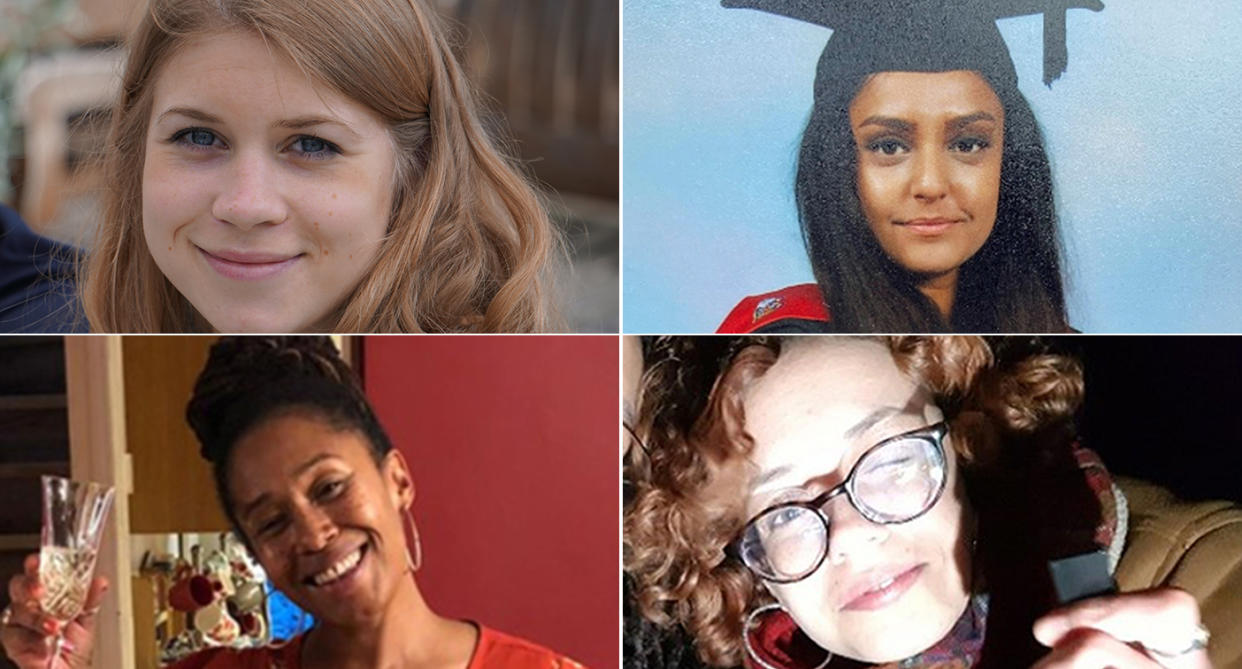Stop saying #NotAllMen: This is what you should be doing to tackle violence against women and girls

The deaths of Sabina Nessa, Sarah Everard, Bibaa Henry, Nicole Smallman, and countless other women at the hands of men, have galvanized conversation about gendered violence in the UK, dominating headlines and political soundbites.
But too often, following moments of national tragedy, the onus to fix violence against women and girls is placed on the victims themselves.
Following the murder of teacher Sabina Nessa, 28, local groups in Greenwich handed out alarms to women and leaflets advising them how to adapt their behaviour when out on the street.
BT also suggested it would launch an emergency 888 phone service to track women via GPS while walking home, which has reportedly been approved by the home secretary, Priti Patel.
Read more: The words women want men to read to understand why they feel threatened
But what about addressing the behaviour of men?
The hashtag #NotAllMen frequently trends online in backlash to the perceived tarring of all men with the same violent brush, but Andrea Simon, Director of the End Violence Against Women Coalition says these moments are not about blaming all men for the behaviour of some, but reinforcing that women should not have to shoulder the burden alone.
“Crucially this is not about defining all men as perpetrators and all women as victims, but we know that when asked, women consistently say they want men to call out each other’s unacceptable views and behaviour and to be helpful bystanders,” says Simon.
Beyond Equality, a charity working with men and boys to create safer communities, reported that following Everard’s death, 150 men came forward to volunteer in two weeks. Previously the number was more like an average of two per week.
Although this is encouraging to see more men taking an active role, it is still a small number when we consider that ONS stats show in the year to March 2020, 207 women were killed across England, Scotland and Wales.
So what should men be doing to help?
Watch: Protest outside Met Police HQ raises awareness about violence against women
Accept all men have a part to play
Dr Stephen Burrell, assistant professor in the department of sociology at Durham University and trustee of White Ribbon UK, says instead of trying to distance yourself from the issue - accept everyone has a role to play and a responsibility in dismantling violence.
“If we listened to what women are saying, we would see that this is not a problem elsewhere, to do with ‘other’ men – it is happening amongst us all,” says Burrell. “Even if we would never perpetrate violence, we all encounter sexism and misogyny in our day-to-day lives, and in wider society.”
Don’t use all your energy on denial
In accepting that all men have a role to play, not just those who are actively harming women, we also need to waste less energy on conversations like #NotAllMen.
Simon says: “What isn’t helpful is defensiveness or denial from men who don’t harm women. This isn’t about singling out individuals - all of us need to be part of the solution by holding each other to account.”
Read out: Women are sharing a simple phone trick that alerts contacts if they're in danger
Speak up
It isn’t always easy to call out friends and family members when they are making misogynistic jokes, especially if it is something that historically you have turned a blind eye to, but it is necessary. Even when it is awkward.
Simon says: “While it can be difficult to have the confidence to speak out...it is really core to changing the deep seated attitudes that condone and minimise sexual violence.” Burrell agrees. “This can involve uncomfortable conversations, and it can be difficult to reflect on our own attitudes and behaviours [in the past].”
Educate younger people
The attempt to dismantle VAWG shouldn’t begin and end with you. One important way to help in the longer term is to talk to young people about the issue in an age-appropriate way.
“One really important way is by giving young people the information they need about sexual consent and discussing harmful gender stereotypes in schools,” says Simon. “Education is crucial to supporting young people to understand what healthy and respectful relationships look like.”
Ensure this is future-proofed
We also need to ensure the conversations we have with young people at school and at home are relevant to the reality of their daily lives, and their future, which includes elements of abuse and harassment online, not just in person.
Simon says: “New forms of abuse have emerged online, like the sharing of intimate images without consent, known as revenge porn, as well as cyber flashing and upskirting. All of these new forms of abuse are part of a continuum of violence against women and girls.”
As well as having these conversations at home, men can also play a part by being vocal in support for government campaigns and education to shift public awareness at a societal level.
Watch: Women's safety campaigner: 'Pace of change is too slow'



